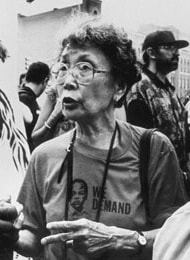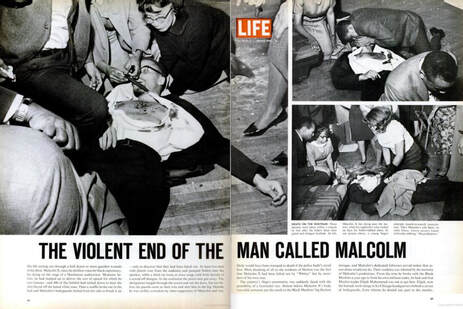 "Yuri Kochiyama", image credits to original owner. "Yuri Kochiyama", image credits to original owner. In recent years, the term "Asian-American" has become widely popularized and accepted. However, there are still many people who do not accept this term, stating that you can only be one or the other. This absurd notion has been around since long before recent events surrounding the coronavirus. It may have stemmed from the Chinese Exclusion Act of 1882. Or perhaps it was driven by the Japanese internment camps during World War II. Either way, the history of Asian-American discrimination has been long and painful. Like us here at Declarasian, there have also been many Asian-American activists throughout history as well. Their efforts made it possible for us to be where we are today, and for America to become a more progressive nation. One of these activists I have recently stumbled across is Yuri Kochiyama, a Japanese-American who was an activist during World War II, when Japanese internment camps began appearing. These Japanese internment camps are rarely acknowledged in school history lessons, as it was a dark time in America's history. During WWII, these camps held over 120,000 Japanese-Americans. Yuri spent most of her childhood in Los Angeles with her family, but they were forced to relocate to internment camps after the attack on Pearl Harbor. Her experience there, and her brief friendship with activist, Malcolm X, inspired her to stand up for not only Japanese-American rights, but also black rights. She wanted to advocate for equality among all races, something that separates her from other Asian-American activists. During the 1960s, Kochiyama propelled the Civil Rights Movement by hosting open houses with her husband, often gathering more than a hundred people at each one. She began inviting strangers to speak at these open houses, and she also began advocating for Harlem students to get equal education opportunities by joining the Harlem Freedom School. Perhaps her most famous moment was by the side of Malcolm X when he was assassinated. She cradled him in her arms as he took his last breaths.
for equal opportunities for all races stems far from the above mentioned. After the Japanese-American internment camps ceased to be utilized, she advocated with her husband for reparations and a government-issued apology to all those who suffered in them. Her efforts were acknowledged when President Ronald Reagan signed into effect the Civil Liberties Act in 1988.
Throughout her lifetime, Kochiyama worked tirelessly towards her purpose and desire to promote social and human rights. Her work is not forgotten today, and has continued to inspire young activists like ourselves to continue fighting for equal human rights to this day. As the Asian communities not just in America but around the world face ever-increasing rates of hate crimes and xenophobic actions, it's more crucial than ever to remind ourselves that we too, can stand up in the face of these situations and change the world. In the words of Kochiyama herself, "the movement is contagious, and the people in it are the ones who pass on the spirit." Author: Carina Sun Sources: https://caamedia.org/blog/2014/08/29/yuri-kochiyamas-words-of-wisdom/ https://obamawhitehouse.archives.gov/blog/2014/06/06/honoring-legacy-yuri-kochiyama https://blogs.brown.edu/ethn-1890v-s01-fall-2016/historical-figures-and-organizations/yuri-kochiyama/ https://encyclopedia.densho.org/Yuri_Kochiyama/
0 Comments
Leave a Reply. |
|


 RSS Feed
RSS Feed